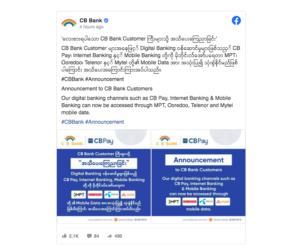Fresh off a 45-day mobile internet blackout that left Myanmar reeling, the regime has restored connectivity for some mobile banking applications and Microsoft’s Office 365 services, according to an internal email from telecom operator Telenor that circulated on Facebook since Monday.
CB Bank, one of Myanmar’s largest private institutes, was the first to announce on Tuesday afternoon that digital services, including its money app CB Pay, internet banking, and mobile banking app, can now be accessed through all mobile network providers including MPT, Ooredoo, Telenor, and Mytel.
The Telenor email, seen by KrASIA, explained that only selected services are available through mobile internet. “Telenor welcomes this development but continues to emphasize that connectivity should be completely restored,” it said. While the email’s signature was removed, it likely originated from the telecom operator.
Telenor’s spokesperson did not comment when contacted by KrASIA. According to the firm’s latest network update on its website, fixed wireless and mobile internet services remain unavailable, as of publication.
Towards a state-controlled intranet?
Some people in Myanmar are worried that the selective service could be the first step towards a “national intranet,” restricting full access to the web. The regime blocked social media platforms, including Facebook, WhatsApp, Instagram, and Twitter, shortly after seizing power on February 1. Some netizens are able to circumvent the ban by using virtual private networks (VPNs).
A national intranet under state control would limit access to the global internet by blocking certain IP addresses, reducing bandwidth, and providing a suite of state-approved search engines and email services, according to ICANNWiki.
Myanmar is no stranger to that type of control. When dial-up internet services arrived around the year 2000, users could only access a state-monitored email system and a limited collection of approved sites until 2011.

Meanwhile, a source close to senior officials at the Posts and Telecommunications Department (PTD) of the Ministry of Transport and Communications, which regulates the industry, told KrASIA that the military has “no plans” to build a closed system.
“The PTD believes that rolling out a national intranet will bring the country back to the stone age, so they will not do that,” the source said. “They allow certain mobile banking apps in order to help the banks maintain essential services. This is based on specific IP addresses and subnets only.”
Myanmar’s banking sector has ground to a halt since February, as workers from the public and private sector, including bank employees, participated in civil disobedience movements across the country. The protests and ensuing brutal crackdown have led to a state of social and economic paralysis, affecting business operations across the country.
A tech entrepreneur, who spoke on condition of anonymity, believes that the regime is trying to “build up a pro-business image.” Microsoft Teams products are the first accessible services as they are widely used by many conglomerates, he explained. Enabling certain internet services might also serve as a bargaining chip for the authorities in exchange for more control over sensitive data and user information.
Businesses applying for whitelisting have to sign a set of documents stating that they are not involved with the Committee Representing the Pyidaungsu Hluttaw (CRPH), an exile government formed by the deposed lawmakers of the coup, or the civil disobedience movement, according to the source close to the PTD.
“It leaves many tech businesses with an ethical dilemma—while their products create value for users, they also could endanger them if required to comply with the government’s data requests,” he explained, predicting that this could also spawn a black market for whitelisted IP addresses that are peddled by corrupt officials.
The news comes as the majority of the country’s population still lacks access to the web after authorities blocked mobile internet services and shut down all public WiFi services in mid-March. Fiber connections in homes or offices are currently not affected by the ban. However, only 0.23% of households in Myanmar have fixed broadband connections, according to 2018 World Bank data.
While the country has experienced recurring nightly internet blackouts from 01:00 a.m. to 09:00 a.m. since February 15, the restrictions on fiber connections seem to be lifted, according to monitoring service NetBlocks.

